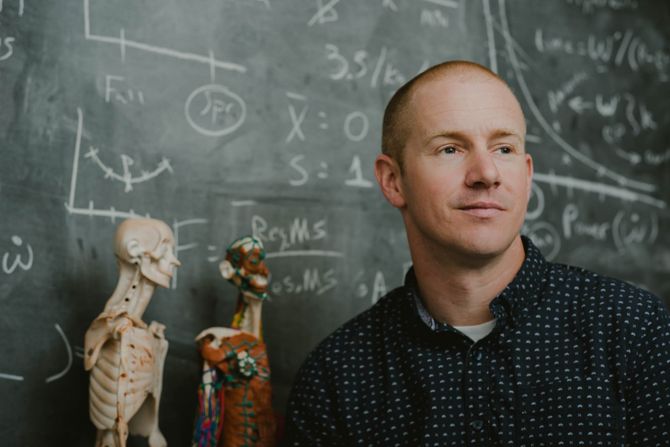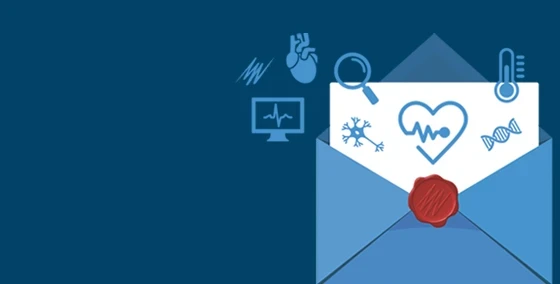ADInstruments would like to congratulate Dr. Ed Merritt from Southwestern University, Texas on receiving this years Macknight Early Career Innovative Educator Award presented by the APS. This award recognizes an APS member who is incorporating innovative teaching techniques and effectively utilizing technology for the engagement of students in physiology education.

Of the award, Ed says “I originally became involved with APS as a graduate student specifically for the science research aspect, but I have been very impressed with them because of their commitment to education. I’ve met some incredible scientists and just as many incredible educators through my involvement with the APS, so I am flattered to be recognized by them for my work.”
When deciding on the winner of this award, APS committee members said they were "extremely impressed with your [Ed’s] application and the clever, innovative laboratory activity in exercise and energy metabolism."
The laboratory in question, tilted “Why is it so hard to Lose Fat? Because it has to get out through your Nose!” stemmed from a pain point of Ed’s after watching an infomercial about an exercise machine which claimed to burn 3.5x the calories compared to a treadmill in only 30 mins! Merritt set out to right this misinformation being reported to the public - as any good scientist would - but after several emails and phone calls to the company in an attempt to discuss exercise and calorie burn, he realised that a) he was getting nowhere and b) this was the perfect opportunity for him as an educator to relate a real life, tangible problem to “those boring metabolic equations that I’m always teaching about and students hate!”
We talked to Ed about how he uses technology in his lessons to enhance the learning of his students as well as finding out more about his research passion in helping trauma and burn victims regain muscle functionality.
How do you use technology to engage students?
Nearly all of my lessons actually start without technology, and discuss the very basic principles of complicated technologic processes (e.g. 12-lead ECG is to the heart what walking around a house and taking pictures from various angles is to understanding a house’s layout). The use of technology though, is what often ENGAGES the student and provides them with their “aha” moments. We can literally measure how much carbon dioxide you exhale to know how much fat your burned or how acidic your blood might be. Utilization of equipment like the PowerLab and LabChart provide visualization of otherwise invisible processes. I think this is absolutely imperative not just to the understanding of many concepts, but to the retention of the concepts.
What got you interested in your current field of research?
My first 'aha' moment to get me here came in a calculus for engineers class as an undergraduate at Virginia Tech. There was a specific instant where I realized I wasn’t interested in engineering, literally as I was sitting in a lecture. I pulled out a course catalog and started reading descriptions of courses that interested me, and they all seemed to be in one department. It was essentially an exercise science department, and I figured, I might as well check out some of those courses. I found them fascinating. One day a new professor named Robert Grange came into one of my classes to announce he needed students to help with his research, and I knew I needed a research credit so I walked over to his lab after class. I was only thinking about the credit I needed to graduate, but I ended up working with him for 3 semesters on a Duchenne Muscular Dystrophy project.
The experience I got in his lab led me to the University of Texas at Austin. I started working towards a Masters Degree (and ultimately PhD) in Exercise Physiology, where most of my research dealt with muscle trauma through a collaboration my advisor, Roger Farrar, had with Dr. Thomas Walters at the US Army Institute of Surgical Research (ISR). I was still floundering a bit with what I wanted to do with my life, and certainly taking my time through graduate school (generally not being too motivated - not going into the lab if it was a nice day and friends were doing something fun). But one day I was at ISR, which is on the Brooke Army Medical Center (BAMC) campus, and I went to lunch with Dr. Walters in the hospital cafeteria. Most of the patients at BAMC at the time, were casualties from the Iraq/Afghanistan war, and here I was in line with them in the cafeteria. We were the same age. We looked and acted almost the exact same. One man I saw looked like a typical exercise physiology student, lean and muscular, except he was missing his hands and face. This was the experience that set me straight. What was I doing taking days off, or putting off writing my dissertation just so I could go to the lake with friends?! The research I was doing could literally help the people I was eating with in that cafeteria.
What do you enjoy most about your work?
Every day I get to discuss something that absolutely fascinates me with people that are “forced” to listen to me! As cliche as it is, convincing someone else that what I think is fascinating IS actually fascinating is what I enjoy. In the lab I developed and wrote about for this award, I still remember the incident that made me realize I had something effective. Using his calculator to work through exhaled oxygen and carbon dioxide data he had collected to determine how long it would take a person to “lose” 10 pounds of fat, he excitedly, yet involuntarily, cursed aloud. He’d had his “aha” moment!
The ADInstruments Macknight Early Career Innovative Educator Award will be presented at the APS annual meeting at Experiemental Biology (EB) on April 7th. The award includes a $1500 honorarium plus travel reimbursement to attend EB, as well as an institutional grant for a PowerLab and supporting software; LabChart, Lt LabStation or a one-year subscription to Lt.
Congratulations again Ed, from all of us here at ADInstruments - we have no doubt we will be hearing more about your achievements in the research and educational fields in the the near future!

